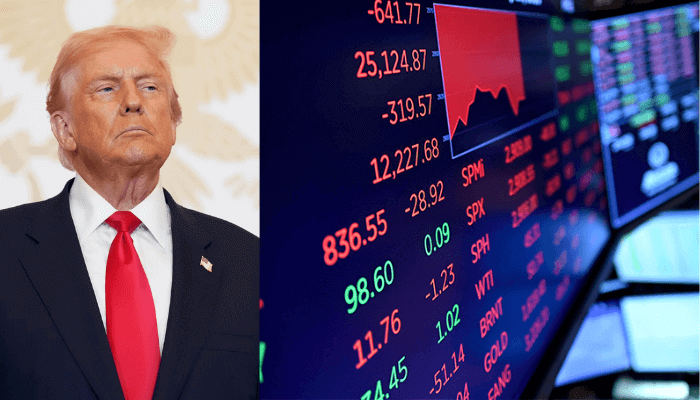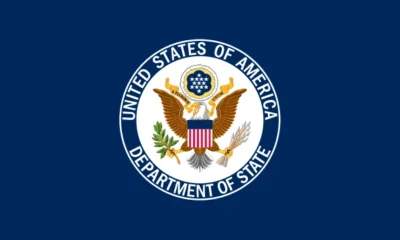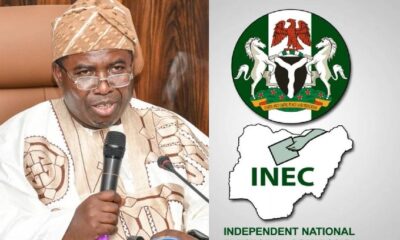Business
Nigeria’s Stock Market Sinks, Naira Weakens After Trump’s Military Action Threat
President Donald Trump’s recent statements and policy threats have triggered panic across Nigeria’s financial markets.

- President Donald Trump’s recent statements and policy threats have triggered panic across Nigeria’s financial markets, wiping out nearly ₦800 billion in equities and weakening the naira, as investors react to rising geopolitical risks.
Investor confidence in Nigeria has taken a sharp hit following U.S. President Donald Trump’s latest remarks on security and religious violence in the country.
Trump’s threat of possible military action against Nigeria, made after reports of attacks on Christians by Islamist militants, spooked investors and triggered massive selloffs across equities, bonds, and the currency markets in early November 2025.
The resulting market turmoil led to losses of nearly ₦800 billion, with major selloffs recorded across medium- and large-cap stocks in the banking, oil and gas, and consumer goods sectors.
Top decliners included SKYAVN (-10.00%), NASCON (-10.00%), OANDO (-9.99%), NESTLE (-9.66%), NEM (-8.20%), PZ (-6.02%), GTCO (-4.86%), ACCESSCORP (-2.95%), UBA (-2.47%), ZENITHBANK (-2.30%), NB (-2.10%), and DANGSUGAR (-1.61%), among others.

Nigeria’s dollar-denominated bonds also tumbled, accounting for all ten of the world’s worst-performing emerging-market bonds that day, as yields rose sharply in response to falling prices.
The naira depreciated by about 1% against the U.S. dollar, while foreign exchange inflows fell to $1.04 billion from $1.37 billion the previous week, according to official market data.
Analysts’ Reactions and Market Outlook
Market analysts described the selloffs as a “short-term panic response”, with some identifying potential buying opportunities amid Nigeria’s ongoing economic reforms and strong year-to-date (YTD) performance before the downturn.
Before Trump’s post on X labelling Nigeria a Country of Particular Concern, analysts at Coronation Research had projected a “mild bullish tone” based on third-quarter earnings. However, the outlook reversed quickly, shrinking the Nigerian Exchange’s YTD gain from roughly 50% to 48%.
DON’T MISS: MTN, Airtel, Glo, Others to Shut Down 3G as rural LTE speeds surge to 15 Mbps
Impact of Global Market Fluctuations
The market decline was compounded by Trump’s earlier tariff proposals—ranging from 20% to 60% on imports from emerging markets—which have already unsettled global trade and commodity flows in 2025.
For Nigeria, an oil-dependent economy, the tariffs and a rise in U.S. shale production pose risks to crude exports, while non-oil sectors face export restrictions and reduced foreign demand.
Nigeria has received over $7.8 billion in U.S. security and humanitarian aid over the past decade. Analysts warn that any suspension of this support could widen Nigeria’s fiscal deficit and push borrowing costs higher, especially amid weak oil revenues.
The controversy has also tarnished Nigeria’s reputation among foreign investors, prompting some multinationals to freeze or reconsider expansion plans across key sectors such as energy, telecoms, agribusiness, and fintech.

Economic Implications
These developments threaten deeper capital outflows and renewed downward pressure on the naira, likely forcing the Central Bank of Nigeria (CBN) to intervene to stabilize the currency.
Despite this, analysts expect potential market recovery later in 2025, driven by improvements in Nigeria’s balance of payments, external capital inflows, and consumer spending.
The All-Share Index (ASI) closed the year up 48%, reflecting resilience amid political headwinds. However, the naira has weakened by about 2% in recent trading ranges.
Analysts say that while political and global pressures have shaken investor sentiment, Nigeria’s underlying market fundamentals remain intact — though heavily dependent on policy stability and foreign confidence.






















